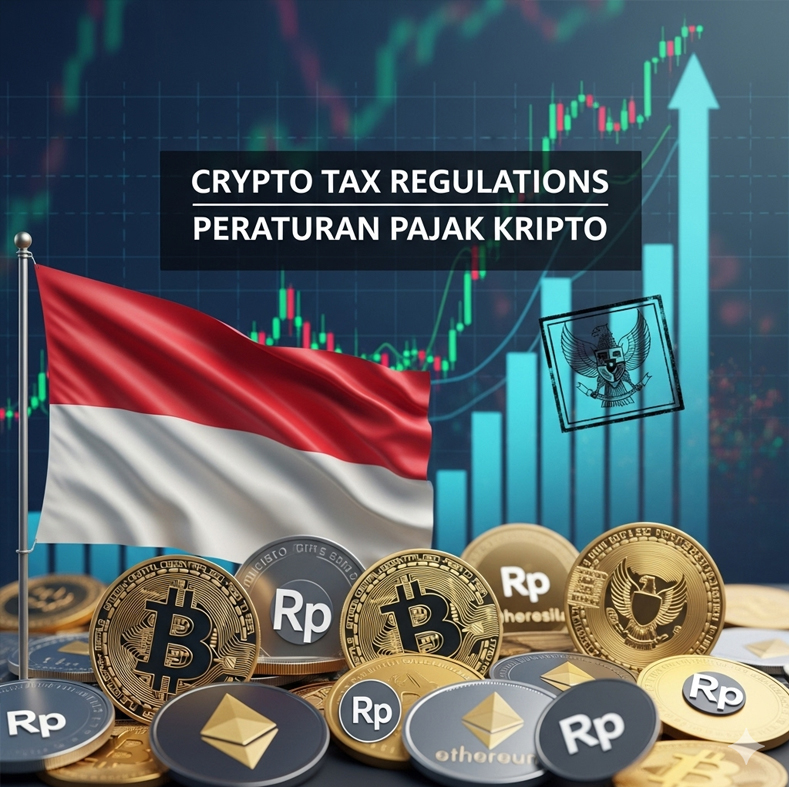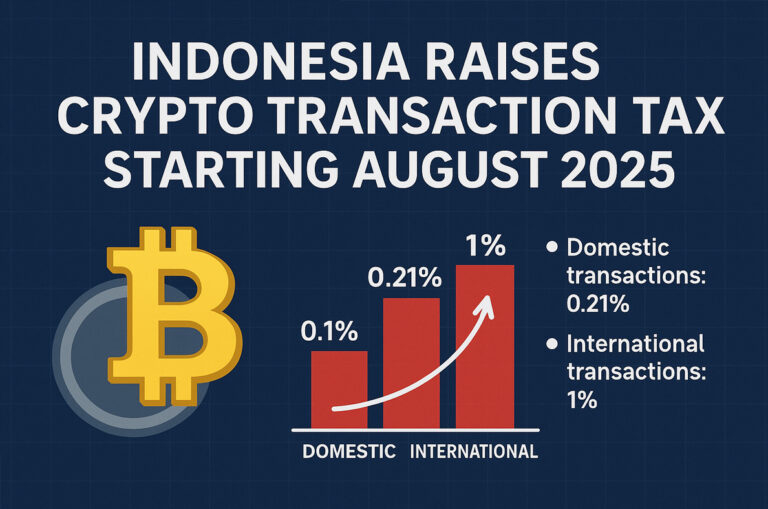Premium Biz Post – Indonesia will implement new tax rules for cryptocurrency transactions on August 1, 2025. The changes introduce higher tax rates for trades on domestic and foreign platforms. Regulators say the move will create fairness and improve oversight in a fast-growing market. The headline “Indonesia Raises Crypto Transaction Tax Starting August 2025” reflects a strategy to strengthen financial regulation and state revenue.

New Tax Rates: A Quick Look
The Directorate General of Taxes announced that domestic crypto trades will face a 0.21% tax, more than double the previous 0.1%. Trades on international exchanges will face a 1% tax, up from 0.2%.
Crypto mining will also see a jump in rates, increasing from 1.1% to 2.2%. Officials say these adjustments reflect the growing scale of Indonesia’s crypto industry, which now ranks among the most active in Asia.
Why the Government Raised Rates
The Finance Ministry explained that crypto adoption in Indonesia has surged beyond expectations. Millions of Indonesians trade digital assets, often with minimal tax contribution. Officials believe these changes will create balance across industries and strengthen financial monitoring.
Key goals include:
- Stronger Oversight: New rates help track crypto transactions and reduce illicit activity.
- Increased Revenue: Authorities expect billions of rupiah in added tax revenue for public services.
- Level Playing Field: Stocks and other assets already face heavy taxes, so crypto will now match those rules.
- Domestic Exchange Growth: Higher foreign rates may encourage users to shift to licensed local exchanges.
Read This : ”From Trash to Treasure The Magic of Upcycled Crafts”
A Booming Digital Asset Market
Indonesia legalized crypto trading as a commodity in 2019. Since then, activity has surged, supported by fintech growth and mobile-first investors.
Experts estimate more than 20 million registered crypto users by 2025, rivaling stock market participation. Popular assets include Bitcoin, Ethereum, and local tokens. NFTs and DeFi apps have also gained traction.
Regulators are now preparing for deeper oversight. In 2025, the Financial Services Authority (OJK) began designing a framework to treat crypto as a financial instrument, transferring authority from the Commodity Futures Trading Regulatory Agency (Bappebti).
Effects on Investors and Platforms
Investors will pay more for trades. A $1,000 transaction on a foreign platform will now incur $10 in tax, compared to just $2 before.
Local exchanges expect growth. Platforms like Tokocrypto and Indodax plan to make tax reporting easier by automating deductions.
Reactions are mixed. Some investors welcome stronger regulation, seeing it as proof of a maturing market. Others fear reduced returns and slower adoption.
Indonesia in a Global Context
Other countries are also tightening crypto policies:
- United States: Broader tax reporting rules for brokers.
- EU: MiCA regulation introduces new licensing and compliance standards.
- Japan and Korea: Higher tax rates; Japan’s reach up to 55%.
- India: 30% flat tax on crypto gains.
Indonesia’s new rates remain lower than India or Japan, though the jump in August 2025 is still significant.
Government Plans Beyond Taxation
The tax increase is part of a wider push to regulate digital assets. Plans for 2025–2026 include:
- Tougher Licensing: Strict requirements for exchanges, wallets, and custodians.
- Consumer Protection: Transparency rules to prevent scams.
- AML/KYC Strengthening: Better anti-money-laundering measures.
- Stablecoin Oversight: Prevent risks to the rupiah’s stability.
- CBDC Research: Bank Indonesia continues to explore a digital rupiah.
Market Opportunities Still Strong
Despite higher rates, Indonesia’s crypto sector remains promising. The country has a young, tech-savvy population, high smartphone use, and a growing middle class.
Venture capital funding for crypto startups hit record levels in 2024. Local companies are building DeFi services, tokenization platforms, and GameFi projects. Government-backed digital literacy programs also aim to prepare citizens for blockchain-based jobs and opportunities.
Steps for Traders to Prepare
Crypto users can plan ahead by:
- Learning the exact tax rates and deadlines.
- Trading through regulated local exchanges to reduce risk.
- Using tracking tools to log all transactions.
- Consulting crypto-focused tax professionals.
- Staying updated on upcoming regulations.
Looking Ahead
The announcement that Indonesia Raises Crypto Transaction Tax Starting August 2025 marks a turning point. Higher taxes will challenge traders but also legitimize the market.
Authorities believe tighter controls will create a safer ecosystem and attract institutional players. The next year will show whether the sector adapts smoothly, but one thing is clear: Indonesia is taking digital finance seriously and building a framework for long-term growth.



